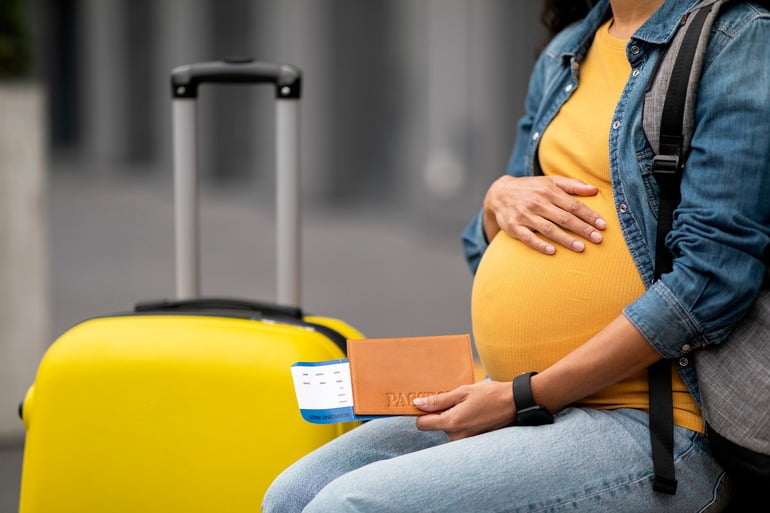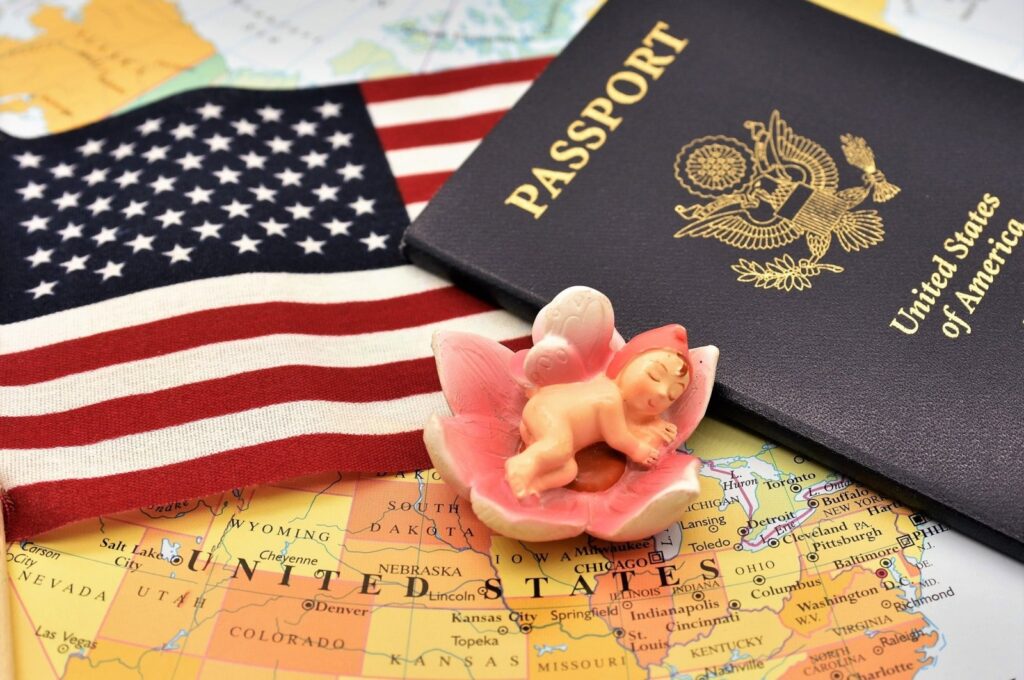Birth tourism, also known as maternity tourism, refers to the practice of traveling to another country for the purpose of giving birth there. This allows the child to obtain citizenship in the birth country, while the parents retain citizenship in their home country.
The trend of birth tourism has been growing in recent years, with expecting mothers traveling abroad seeking benefits like birthright citizenship, high-quality healthcare, and other incentives for their child. While there are certain advantages, birth tourism also raises complex legal, ethical, and political issues.

In this comprehensive guide, we will dive into the fascinating world of birth tourism, uncovering everything you need to know about this unique travel niche. We will explore the history and origins of birth tourism, look at popular birth tourism destinations, discuss the reasons why expectant mothers engage in it, examine the debate surrounding the practice, and also bust some common myths.
So if you are intrigued by this unconventional form of travel and want to learn all about birth tourism, its implications and the ongoing debate, read on!
What is Birth Tourism?
Birth tourism refers to the practice of traveling to another country for giving birth, so that the child can obtain citizenship of that country. The expectant mother will usually time their travel close to their due date.
The main reason behind birth tourism is to gain some advantage from the birth country’s citizenship policy. This is especially true in cases where gaining citizenship in the mother’s home country is difficult. So birth tourism allows the child to have dual citizenship or citizenship of the birth country, which offers more benefits.
Popular reasons for birth tourism include:
- The child gains citizenship and a passport from the country they are born in
- Better educational opportunities and other benefits of citizenship in Western countries
- The family can potentially move and live in the birth country in the future
- Quality healthcare and favorable maternity care in the destination country
- Tax benefits and access to social welfare programs for the child in the future
The expectant mothers will usually stay in rented apartments, hotels or maternity facilities during this period. The travel is timed close to the due date, so the birth happens in the destination country. Aqfter the child is born and the passport acquired, the mother returns to her home country.

Origins of Birth Tourism
The concept of birth tourism began in the 1980s and 1990s. Wealthy expectant parents from Hong Kong started traveling to give birth in Northern America. This allowed their child to have Canadian or American citizenship along with all the benefits.
But it was the introduction of birthright citizenship in the US that really caused birth tourism to gain popularity. The 14th amendment of US constitution grants automatic citizenship to any child born on American soil. When this became known, many people saw it as an opportunity.

Soon, expecting mothers from China, Nigeria, Russia, Turkey and other countries with difficult immigration policies started traveling to deliver their babies in USA. The child would gain US citizenship by birthright, allowing the family to immigrate later potentially.
By the late 1990s, birth tourism had grown into an entire industry, with consultants and agencies offering package deals. They would arrange everything from the doctors appointments, accommodation and even sightseeing for mothers coming to give birth. This made the process easy and accessible.
Today, many countries like USA, Canada, UK, Australia, France, Germany, Singapore and Hong Kong are popular birth tourism destinations. Each country has its own incentives, but the promise of citizenship or residency status for the newborn remains the biggest motivator.
While the exact number is hard to determine, estimates suggest around 10,000 mothers travel each year specifically for giving birth. The practice has become especially common among affluent families in China and Russia. But with globalization and cheaper travel options, it is now within reach of middle-class citizens too.
Popular Birth Tourism Destinations
Here are some of the most popular destinations for birth tourism along with key factors that make them attractive:
USA
The USA is the most sought after birth tourism location. Under the 14th amendment, a child born on American soil automatically becomes a citizen. This offers many future benefits like education, employment, healthcare etc. The child can also sponsor their parents’ citizenship later.
Canada

Similar to the USA, Canada also grants automatic citizenship to anyone born within the country. Under the jus soli policy, children born in Canada can enjoy all the same rights as native citizens.
UK
The UK is a big draw for birth tourists due to the high quality healthcare, education systems and future employment opportunities. Being an EU member also allows easy travel access and benefits.
Australia
Australia grants citizenship by birth on its soil. It is seen as an attractive destination due to its high standard of living, social welfare, education and healthcare. The process of applying for parent citizenship is also easier.
France
France used to be a jus soli country, but now only grants citizenship for children born to at least one parent who is also French. But the country’s excellent healthcare and social benefits still attract many birth tourists.
Singapore
Singapore has a globalized culture and economy along with an uncomplicated tax structure. This appeals to many parents who want career and educational opportunities for their child.
The Rise of Birth Tourism in USA
Of all the preferred birth tourism destinations, USA has seen the biggest growth in recent years. There are many interconnected reasons why expecting foreigners specifically travel to America to give birth:
- Birthright citizenship under the 14th amendment – Any child born on American soil automatically becomes a US citizen. This grants them rights and future benefits regardless of parent citizenship.
- High-quality healthcare – The US has advanced healthcare facilities and resources which many developing nations lack. Women can get expert prenatal and delivery care.
- Education and employment – Future access to American education, jobs, government programs etc. appeals to foreign parents.
- Sponsoring parents – Once they turn 21, the child can sponsor their parent’s American citizenship and help the whole family immigrate.
- Dual citizenship – The baby gains American citizenship by birth, while still retaining citizenship of the parents’ home country.
- Ancestral connection – Many Chinese and Nigerian families have ancestral connections to USA. Having American-born children strengthens this bond.
While difficult to accurately estimate, some researches suggest around 40,000 women engage in travel birth tourism to USA every year, mainly from China and Russia. Companies offering birth vacation packages make the process easy, affordable and accessible.
This rise has led to debates around closing the birthright loophole. But no changes have been implemented yet. Currently, giving birth on American soil remains the most straightforward path to US citizenship.
Birth Tourism in Canada
Similar to the US, Canada also provides unconditional citizenship to any child born within the borders under the jus soli policy. This makes having a baby in Canada extremely desirable for non-Canadian citizens.
Some key factors that drive birth tourism to Canada include:
- Automatic citizenship for babies born in Canada, no conditions.
- High-standard healthcare and medical facilities for delivery and postnatal care.
- Future access to education, employment, and social welfare benefits.
- Opportunity to sponsor parents and family to immigrate to Canada once the child turns 18.
Dual citizenship allows benefits from both Canada and the parents’ native country.
According to studies, around 5,000 babies are born in Canada each year to foreign parents who travel to give birth. The majority are from China, followed by Nigeria, UAE, Saudi Arabia, South Korea etc.
Vancouver in British Columbia is the biggest birth tourism hub. The city has a large Asian immigrant population, and mainland Chinese find it especially appealing. Other favored spots include Toronto and Montreal, which also have large international communities and birth facilities targeting foreign mothers.
While Canada has been trying to limit birth tourism, no strict laws have been passed yet. Foreign women are still routinely traveling to have Canadian citizen babies. The only requirement is that Canadian public health services cannot fund them for delivery and care.
Which Areas in the U.S. Are Seeing the Most Birth Tourism?

Certain states and cities within the USA have become hubs for birth tourism over the years. These locations have large international communities, birth facilities catering to foreign mothers, and other established networks. The most popular spots are:
- Los Angeles
Los Angeles offers diversity and a thriving Asian community that facilitates Chinese birth tourism. Many agencies and apartment complexes even cater exclusively to pregnant Chinese tourists.
2. New York City
Home to immigrants from all over the world, NYC is highly convenient for birth tourists. It offers high-quality medical care and facilities.
3. Miami
Miami has a strong Russian population, along with birth centers targeting Russian tourists. It provides a warm climate and amenities to recover post-childbirth.
4. California
Overall, California is a big magnet for birth tourism from across Asia and Russia. Other hotspots in the state include San Francisco, Irvine, and Orange County.
5. Seattle
Seattle is emerging as a new West Coast birth tourism destination with its diversity, amenities for Asian visitors and excellent hospitals.
6. Chicago
Chicago attracts many pregnant travelers with its advanced medical facilities, thriving international neighborhood enclaves and connectivity.
7. Texas
Cities like Dallas, Houston, and Austin are fast becoming sought-after birth tourism sites due to affordable living costs and access to quality healthcare.
Is Birth Tourism Illegal?

There are no federal laws in the USA explicitly banning birth tourism. Giving birth in the country is technically legal for non-residents. However, there are some gray areas:
- Lying on travel visas about the intention to give birth is visa fraud. But tourist visas don’t require disclosing pregnancy.
- Breaking State laws – some states have enacted restrictions on birth tourism businesses. Promoting or facilitating it is illegal.
- Tax evasion – not paying US taxes or hospital bills related to birth and care.
While not illegal per se, it does raise moral concerns about gaming the immigration system. There are risks like anchor baby citizenship scams.
So in most cases, simply traveling to give birth is not illegal for the mother. But related activities like visa fraud, tax evasion, identity theft, or immigration scams may violate laws. There is also a lot of controversy around whether birthright citizenship should continue in its current unconditional form.
For countries like Canada, the UK, and Australia too, there are currently no direct laws banning birth tourism. But it exists in an ethical gray zone, and efforts to discourage it are increasing. Proving residence status and financial eligibility are now required in some countries to get citizenship by birth.
So while giving birth abroad is still possible in many desired destinations, the legal landscape is shifting towards greater stringency to restrict birth tourism. The ongoing debates weigh concerns like immigration ethics, healthcare costs, citizenship privileges and national security against human rights.
Common Myths about Birth Tourism
Like any widely discussed issue, birth tourism also comes loaded with many misconceptions. Here are some commonly held myths versus reality:
Myth: Birth tourism is only popular among wealthy people.
Reality: While initially it was mostly the rich who could afford birthing vacations, costs have dropped over the years, making it accessible to middle-class citizens too. Agencies provide cost-saving packages.
Myth: Birth tourism guarantees permanent residence and future migration.
Reality: Gaining citizenship by birth does not directly grant the whole family rights to live or work there. The child still needs to sponsor parents’ immigration after turning 21. Each case is evaluated individually.
Myth: It is mainly specific countries like China and Russia driving birth tourism.
Reality: While Chinese and Russians make up a large share, research shows expectant parents travel from a diverse range of countries, including Nigeria, South Korea, Saudi Arabia, Turkey, India, and Vietnam.
Myth: Birth tourism is always about gaining U.S. citizenship.
Reality: USA is a popular choice but not the only one. Birth tourism is equally prevalent in other desired destinations like Canada, UK, Australia, and the EU.
Myth: Getting citizenship by birth makes you automatically American, Canadian, etc.
Reality: Beyond legal status, actually assimilating into the culture is still essential. Experts encourage building real connections through language, community, and cultural knowledge.
So despite many perceptions, the reality of birth tourism is more nuanced. Like any complex socioeconomic phenomenon, it has many sides. This makes objective analysis challenging but important.
Frequently Asked Questions about Birth Tourism
Here are answers to some common questions about the unique practice of birth tourism:
Is birth tourism legal?
There are no direct federal laws banning birth tourism in destinations like the USA, Canada, UK, or Australia. So it exists in a gray area but is not explicitly illegal in most cases. Mothers can travel to give birth unless violating other rules.
Does birth tourism lead to automatic citizenship?
Yes, countries like the USA and Canada grant unconditional birthright citizenship. The child is eligible for a passport and benefits as a native citizen regardless of parental citizenship. However , additional eligibility criteria for parents have been introduced in some countries like the UK and Australia.
Is getting citizenship through birth tourism ethical?
It raises complex ethical debates around fairness, misuse of rights and immigration systems, healthcare costs, and national security. However, there are also arguments about human rights and freedom of travel. So there are compelling perspectives on both sides.
Can the whole family immigrate through birth tourism?
No, only the child gains citizenship at birth. The parents cannot immediately claim residence or immigration rights solely on the basis of an ‘anchor baby’. The child would still need to sponsor their family’s immigration after turning legal age. Each case is assessed on its own merits.
Does it provide dual citizenship for the baby?
Yes, by birthright, the child typically gains citizenship of the country they are born in, along with parental citizenship. This allows enjoying benefits of both, like owning property or education and employment in either country.
Is visa or tax evasion involved in birth tourism?
There are cases where mothers hide their intentions, overstay visitor visas, or use Medicaid benefits meant for residents in violation of laws. But when done legally, with tourist visas and privately paid care, birth tourism does not automatically equate to fraud.
So, in summary, while legal in essence, birth tourism inhabits an ethical gray area. Its implications are complex, continually shifting, and important to understand in a globalized world.
Takeaway
Birth tourism offers a fascinating look into how some families are navigating immigration, citizenship, and opportunity in today’s globalized world. By traveling abroad to give birth, they can provide greater freedoms and benefits for the next generation.
However, it also touches on many complex debates around ethics, rights, identity, and social systems. There are compelling views both for and against birth tourism. There are also calls to reform elements like unconditional birthright citizenship.

What does seem clear is birth tourism is the symptom of larger issues. Challenges like inequities, conflicting values, and policy loopholes need addressing at their root. As our world grapples with growing global mobility in the 21st century, we will likely see these questions come up again and again.
The ever-evolving phenomenon of birth tourism provides a glimpse into these global shifts. Hopefully, this in-depth guide gave you a comprehensive understanding of what birth tourism is all about. Its past origins, current scale, reasons for popularity, legal standing, and ethical controversies around using travel to secure citizenship and opportunity. There are certainly many fascinating facets still left to explore!
We hope we’ve answered your questions in this blog, in case you want to ask more on this topic, feel free to contact us, we will be happy to scroll our research papers again :). Contact us button is right there in the bottom… Or just click here…
